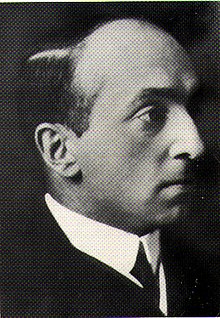Clemens von Franckenstein
Clemens Erwein Heinrich Karl Bonaventura Freiherr von und zu Franckenstein (born June 14, 1875 in Wiesentheid ; † August 22, 1942 in Hechendorf ) was a German composer and the last general manager of the royal Bavarian court and national theater .
Life
Franckenstein was the son of Karl Freiherr von und zu Franckenstein (1831–1898) and Elma Countess von Schönborn -Wiesentheid (1841–1884). His brother was Georg von Franckenstein , kuk envoy and ambassador to London. He grew up between Vienna and Franconia and was very musical from an early age, encouraged by his also musical father.
From an early age with Arthur Schnitzler and Hugo von Hofmannsthal friends, he studied with Ludwig Thuille in Munich, and later with Iwan Knorr at the Hoch Conservatory in Frankfurt, where he completed friendship with Engelbert Humperdinck and with Stefan George , whose poetry he was the first set to music. In 1901 he went on a tour as a conductor through North America, in 1902 he became opera conductor in London and in 1907 he was appointed stage manager at the Wiesbaden Court Theater , and in 1908 at the Berlin Court Opera . In 1912 Franckenstein took over the management of the Munich Court Opera and was general manager from 1914 to 1918. He held this position again from 1924 to 1934 at what was now the Bavarian State Opera and during his tenure also shaped the Munich Opera Festival .
Clemens von Franckenstein was a well-known opera composer in his day, but was remembered by many as general director of the Munich Court Theater and the Bavarian State Theater (Bayerische Staatsoper). This office of artistic director , which he was the only one to hold twice, namely from 1912 to the collapse of the Bavarian monarchy in 1918 as the last royal general director, and again from 1924 to 1934, brought him together with many well-known personalities in literature and music. He was an intimate friend of Hugo von Hofmannsthal and Arthur Schnitzler, and frequented Richard Strauss , Max Reinhardt and many other artists of the time.
In April 1933 he was one of the signatories of the protest of the Richard Wagner City of Munich against Thomas Mann's suffering and greatness of Richard Wagner . He was forced into retirement in 1934, which the Nazi regime was able to do through the law to restore the civil service . Since 1935 he was married to the soprano Maria Nezádal . A committed Catholic Christian and a staunch opponent of the Nazi regime, he died in August 1942, deeply disappointed in the political developments in Germany, in artistic exile in Hechendorf near Munich .
He became known to a wide audience as a composer who enjoyed national success , especially with his opera Des Kaisers Dichter or Li-Tai-Pe, which premiered in Hamburg in 1920 ; he also composed songs, chamber music, orchestral works and stage pieces.
Works
Operas
- Griseldis . Opera in 3 acts, op.6 ( Libretto : Oskar F. Mayer ; premiere : Troppau 1898)
- Fortunatus. Opera in 3 acts , op.16 (Libretto: Jakob Wassermann )
- Rahab . Opera in 1 act, op.32 (Libretto: Oskar F. Mayer; Premiere: Budapest 1909)
- The bee . Pantomime, op.37 (Libretto: Grete Wiesenthal ; premiere: Darmstadt 1916)
- Li-Tai-Pe ( The Emperor's Poet ). Opera in 3 acts, op.43 (Libretto: Rudolf Lothar ; premiere: Hamburg 1920)
Orchestral works
- Symphonic Fantasy for Orchestra op.15
- Festive music for large orchestra, op.35
- Variations on a Theme by G. Meyerbeer op.45
- Rhapsody for orchestra op.47 (1926)
- Dance suite
- serenade
- The old song
- Prelude for orchestra op.50
- Four dances for orchestra op.52
- Songs, chamber music
Individual evidence
- ^ Ernst Klee : The culture lexicon for the Third Reich. Who was what before and after 1945. S. Fischer, Frankfurt am Main 2007, ISBN 978-3-10-039326-5 , p. 161.
- ↑ Karl Josef Kutsch , Leo Riemens : Large singer lexicon . Third, expanded and updated edition. Berlin 2000, ISBN 3-89853-133-3 , p. 17670.
Sources and literature
- The music in the past and present . 1st edition. Volume 4, pp. 687f.
- Hugo von Hofmannsthal: Correspondence with Clemens von Franckenstein. Rombach, Freiburg im Breisgau 1998, ISBN 3-7930-9182-1 .
- Andrew D. McCredie: Clemens von Franckenstein (1875-1942). A German Associate of the English Frankfort Group. The orchestral song and his settings from Hans Bethge's "The Chinese Flute" . In Miscellanea Musicologica. (Adelaide Studies in Musicology, Vol. 13). 1988.
- Andrew D. McCredie: Clemens von Franckenstein . (Series Composers in Bavaria, Vol. 26). Schneider, Tutzing 1992, ISSN 0937-583X .
- Andrew D. McCredie: The comparative case histories of Karl Amadeus Hartmann, Clemens von Frankenstein and Paul von Klenau as variant examples of Innere Emigration: Problems and issues for German music historiography of the period 1918–1945. In: Glazba, ideje i drustvo: Svecani zbornik za Ivana Supicica / Music, ideas, and society: Essays in honor of Ivan Supicic . Hrvatsko Muzikolosko Drustvo, Zagreb 1993, ISBN 953-6090-01-5 , pp. 215-235. (English)
- Alfons Ott: Franckenstein, Clemens Erwein Georg Heinrich Karl Bonaventura. In: New German Biography (NDB). Volume 5, Duncker & Humblot, Berlin 1961, ISBN 3-428-00186-9 , p. 330 f. ( Digitized version ).
Web links
- Literature by and about Clemens von Franckenstein in the catalog of the German National Library
- Clemens von Franckenstein in the Bavarian Musicians' Lexicon Online (BMLO)
- The estate in the Bavarian State Library
| personal data | |
|---|---|
| SURNAME | Franckenstein, Clemens von |
| ALTERNATIVE NAMES | Franckenstein, Clemens Erwein Heinrich Karl Bonaventura Freiherr von und zu |
| BRIEF DESCRIPTION | German composer |
| DATE OF BIRTH | June 14, 1875 |
| PLACE OF BIRTH | Wiesentheid , Lower Franconia |
| DATE OF DEATH | August 22, 1942 |
| Place of death | Hechendorf am Pilsensee , Upper Bavaria |

